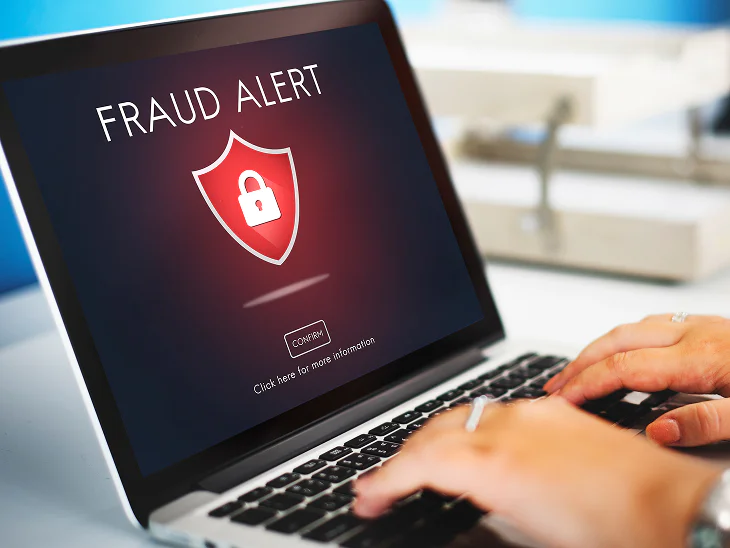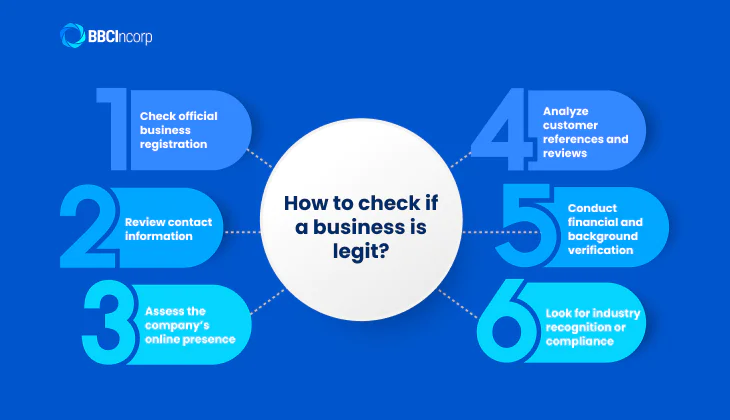
Table of Contents
Fraudulent businesses are more prevalent than ever, with global financial fraud costing over $5 trillion annually(1). In the United States, 33% of individuals(2) have experienced identity theft, highlighting the critical need to verify a company’s legitimacy before engagement. Scammers employ fake credentials, deceptive tactics, and professional-looking websites to appear credible. Without proper checks, investors, business partners, and customers risk financial loss, legal trouble, and reputational damage.
This guide outlines essential steps on how to check if a company is legit, covering official registrations, financial records, and customer feedback. With the right approach, you can make informed decisions and engage with businesses confidently.
Why checking a company’s legitimacy matters
Scams are everywhere, and their impact is huge. Furthermore, falling for a fake company doesn’t just mean losing money, it can also damage your reputation and lead to legal trouble. But when you know how to check if a business is legit, you will be able to avoid these risks.
The real cost of fraud
A fraudulent company can inflict financial loss, reputational damage, and legal trouble. Victims often lose substantial sums through fake investments, counterfeit products, or undelivered services.
Businesses that unknowingly partner with scammers may suffer compliance issues, leading to fines and legal action. Reputation is also at stake: associating with an illegitimate company can and will erode customer trust, as well as your credibility.

Common scams to watch out for
Fraudsters use clever tricks to seem legitimate. Some of the most common scams include:
- Business impersonation: These scams involve fraudsters setting up fake websites that are virtually indistinguishable from real brands, particularly global giants such as Amazon, PayPal, and Facebook(3). By replicating logos, colors, URLs, and even chatbots, they deceive users into paying for phantom products or services.
- Phishing websites: Phishing websites are a common online threat. Scam emails, often mimicking staff communications, will direct you to these deceptive sites with the sole purpose of capturing your personal data.
- Fake reviews: Be alert for overly positive reviews that lack authenticity. Investigate the reviewers: suspicious, inactive, or cloned accounts are strong indicators of manipulation. Repeated comments are another sign of review seeding. You should begin your review research by checking negative feedback in advance.
Spotting these red flags early saves time, money, and stress. Checking official registrations, researching customer feedback, and verifying online presence are how to find out if a company is legit and stay safe.
Red flags of fraudulent businesses
Identifying a scam before getting involved can save time, money, and frustration. Here are key warning signs to watch for on how to determine if someone is operating a legitimate business.
Poorly maintained website
A real business provides a clear, professional website with proper contact details, terms, and secure payment options. Scam websites often lack essential information, have broken links, or provide vague descriptions. Missing refunds or privacy policies raise serious concerns.
Pressure for advance payments
Fraudulent companies insist on full payment before delivering any service or product. They avoid written agreements and push for quick transactions, leaving no time for proper checks. A trustworthy business outlines clear terms, offers secure payment options, and follows fair billing practices.

Conflicting information
False promises often expose a scam. If a company claims to offer premium services at unrealistically low prices or if customer reviews contradict its advertisements, something is off. Checking official records and verifying details from multiple sources helps uncover the truth.
How to check if a business is legit?
These fraudulent companies often appear credible at first glance. Verifying their authenticity before any engagement prevents financial risk and ensures trust in business dealings. A structured approach involves checking official records, verifying contact details, assessing online presence, analyzing customer feedback, and conducting financial background checks.

Step 1: Check official business registration
A legitimate company registers with the appropriate government authorities. Business registration ensures compliance with legal and financial regulations.
- Search official databases: Many countries provide online tools to check a company’s registration. For example, the U.S. Secretary of State website allows searches for registered businesses. In the UK, Companies House provides incorporation records, and in Hong Kong, the Companies Registry offers business details.
- Verify business licensing numbers: A registered company should have a license that matches its industry. For regulated sectors such as finance, healthcare, and construction, licensing is mandatory.
- Use third-party verification tools: Platforms like OpenCorporates, Companies House, and local business directories provide ownership details, registration history, and compliance status.
If a company claims to be international, check its registration in multiple jurisdictions. A business with operations in multiple countries should have records in each location.
Step 2: Review contact information
Scammers often provide vague or inconsistent contact details to avoid detection. A genuine business lists clear and verifiable information. Thus that is how to find out if a company is legitimate: review their contacts.
- Confirm the address: Use Google Maps or a business directory to check if the location exists. A legitimate business has a physical office or an official virtual office registered with government authorities.
- Call the phone number: A real company maintains a professional phone presence. If calls go unanswered, redirect to unrelated numbers, or reach unprofessional operators, this raises concerns.
- Cross-check contact details: Compare the company’s website, official documents, and social media pages. Inconsistencies suggest potential fraud.
In reality, scammers often use free email services like Gmail or Yahoo instead of official domain emails (e.g., @companyname.com), so you should always check the email domain for authenticity.
Step 3: Assess the company’s online presence
A strong digital presence signals credibility. Fraudulent businesses often lack consistency across platforms.
- Examine the website’s professionalism: Secure HTTPS encryption, clear privacy policies, and high-quality content indicate legitimacy. Poor grammar, broken links, or unsecured payment pages are red flags.
- Check social media activity: A real business maintains consistent branding, frequent posts, and responsive customer interactions. A lack of engagement or sudden account deletions suggests fraudulent behavior.
- Use the WHOIS database: Checking domain registration details helps uncover ownership information and site history. If WHOIS lacks sufficient information, you can utilize Wayback Machine to trace through the website’s evolution. Be cautious of recently registered domains or those linked to multiple, disparate businesses.
- Review LinkedIn and professional networks: A well-established company features verified leadership profiles, employee connections, and company updates. Fake businesses may lack transparency about their team.
Scam websites often copy content from legitimate businesses. Running a sentence from a suspicious website through a search engine can reveal if it was copied from another source.
Step 4: Analyze customer references and reviews
Customer feedback provides valuable insights into a company’s reliability. Here’s how to tell if a company is legitimate: through a mix of positive and critical reviews.
- Look for independent reviews: Platforms like Better Business Bureau (BBB), Trustpilot, and Google Reviews highlight customer experiences. A business with no presence on trusted review sites may be unreliable.
- Identify negative patterns: Frequent complaints about non-delivery, poor service, or deceptive practices indicate risk.
- Beware of overly positive or generic testimonials: Fake reviews often lack specific details and use similar wording. Real customers provide balanced feedback with clear experiences.
- Request direct references: A trustworthy business willingly shares past client testimonials, case studies, or verifiable references.
Search “[Company Name] scam” or “[Company Name] complaints” to check if others have reported suspicious activity.
Step 5: Conduct financial and background verification
Understanding a company’s financial health and legal standing helps assess stability and risk.
- Check credit reports: Services like Dun & Bradstreet and Creditsafe provide business credit scores, payment histories, and financial strength indicators.
- Investigate company owners: Public records, regulatory databases, and news sources reveal if executives have been involved in fraud, lawsuits, or bankruptcies.
- Review financial statements: Publicly traded companies disclose financial reports, annual statements, and audits. Private businesses should provide relevant financial data upon request. A company that refuses to share any financial or ownership details may have something to hide. Please always ask for transparency in dealings.
Step 6: Look for industry recognition or compliance
Accreditations, certifications, and professional memberships demonstrate adherence to industry standards.
- Check for regulatory affiliations: Businesses in finance, healthcare, and legal sectors must comply with regulations from authorities like the Financial Conduct Authority (FCA) or the U.S. Securities and Exchange Commission (SEC).
- Verify industry memberships: Organizations like the Better Business Bureau (BBB) or local chambers of commerce vet businesses before granting membership.
- Look for awards and endorsements: Industry recognition from reputable sources adds credibility. Fake businesses, in many cases, tend to display false accreditation logos.
Final thoughts
Fraudulent and criminal businesses are constantly adapting, coming up with new ways of deceiving naive customers and investors. For these reasons, you should know how to check if a company is legitimate for the sake of your finances, reputation, and peace of mind. Trustworthy businesses, like BBCIncorp, operate transparently, provide reliable information, and maintain a consistent presence across multiple platforms.
There are many steps to keep in mind, including checking the registration of the business, checking the contact details, evaluating the online presence, analyzing reviews, determining financial stability, and verifying the industry recognition.
Eventually, scams can be prevented through careful due diligence. Following that, business relationships can be made more secure and reliable for everyone.
—
References:
(1): https://www.crowe.com/global/news/fraud-costs-the-global-economy-over-us%245-trillion
(2): https://www.proofpoint.com/us/newsroom/press-releases/global-cybersecurity-awareness-survey-reveals-33-percent-us-respondents-have
(3): https://bbbmarketplacetrust.org/wp-content/uploads/2024/04/2023-BBBScamTracker-RiskReport-US-040224.pdf
Frequently Asked Questions
How do I know if a company's certifications or awards are real?
If a company showcases certifications or awards, you must verify their authenticity before conducting transactions.
Begin by locating the official website of the organization that supposedly issued the credential. Then, find sections like “Verify,” “Directory,” or “Winners” and search for the company’s details. The certification validity period is a crucial factor as well.
If online verification is not an option, you can also reach out to the issuing body directly through their official contact channels to confirm their records.
What if a company only operates online? Can they still be legitimate?
Many legitimate and successful companies operate exclusively online, similar to the software applications and streaming services you use daily. Their website functions as their primary business presence, and this is a perfectly valid model.
However, because there isn’t a physical location to visit, you must carefully evaluate their online presence for signs of legitimacy. Look for a professional and informative website with readily available contact details, and clearly stated policies.
Additionally, remember to look through independent review websites for feedback from other customers beforehand.
Disclaimer: While BBCIncorp strives to make the information on this website as timely and accurate as possible, the information itself is for reference purposes only. You should not substitute the information provided in this article for competent legal advice. Feel free to contact BBCIncorp’s customer services for advice on your specific cases.
Industry News & Insights
Get helpful tips and info from our newsletter!
Stay in the know and be empowered with our strategic how-tos, resources, and guidelines.





